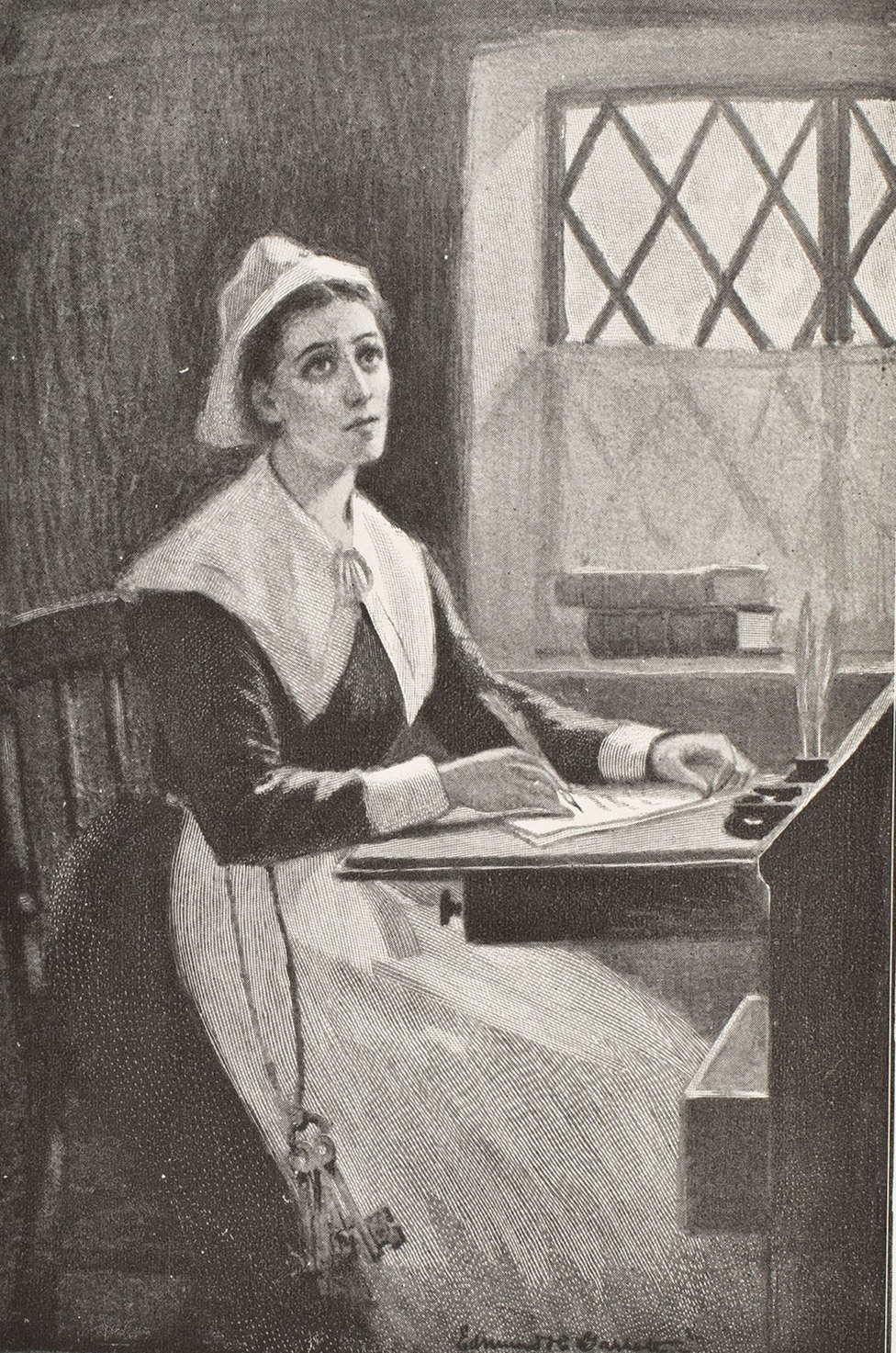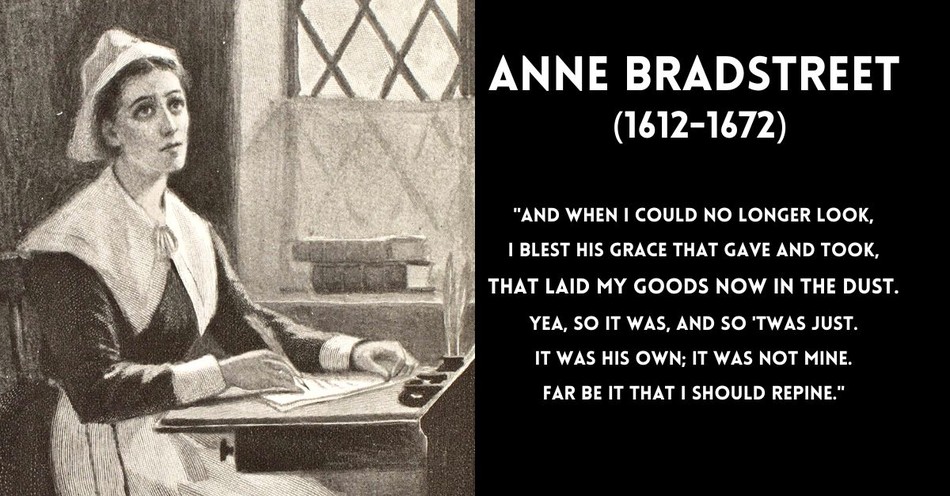In 1650, Master Stephen Bowtell, a London publisher and bookseller, published a book of poems titled THE TENTH MUSE Lately Sprung up in AMERICA, OR Severall Poems... The book is a milestone in English and American literature. For one thing, The Tenth Muse contained the first verses by an American that could stand beside England's poetry. But The Tenth Muse is important for more than its place of origin. It was the first volume of enduring English language poetry produced by a woman. The author was Anne Bradstreet.
Anne Bradstreet was a Puritan, the daughter of Thomas Dudley, who would serve as a governor of Massachussetts Bay Colony. When just sixteen, she wed Simon Bradstreet, and sailed with him for the New World. Life was hard, not only because the New World was untamed, but because she was often ill, lost her home in a fire, saw a daughter die at four, and was separated from her beloved husband for extended periods when duty took him to England. These experiences, viewed through the lens of faith, found their way into her finest poems.
Written in spite of bouts of illness, blows of personal tragedy, and the tedium of household chores (she reared four sons and four daughters) her poems nonetheless show originality and craftsmanship, their themes often religious, the spelling quaint, the meanings plain:
"Lord, be thou Pilott to the ship,
And send them prosperous gailes;
In storms and sickness, Lord, preserve.
Thy goodness never failes."
Anne's God was real and she cried out to him, "My Fathers God, be God of me and mine." In a short autobiography of her religious experiences she wrote, "Among all my experiences of God's gracious dealings with me, I have constantly observed this--that he has never suffered me long to sit loose from him, but by one affliction or other has made me look home and search what was amiss."
Christ was the center of her devotion: "...there is but one Christ, who is the Sun of Righteousness, in the midst of an innumerable company of saints and angels; those saints have their degrees even in this life, some are stars of the first magnitude, and some of lesser degree; and others (and indeed the most in number), but small and obscure, yet all receive their luster (be it more or less) from that glorious sun that enlightens all in all..."
On this day, September 16, 1672, the voice of the Tenth Muse was silenced by consumption. Her son wrote that she "wasted to skin and bone," was tortured by rheumatism and had a leaking sore that disfigured her arm. Sick and weary, she had looked forward to death. "Now I can wait, looking every day when my Savior shall call for me...O let me ever see you who are invisible, and I shall not be unwilling to come, though by so rough a messenger."
Anne Bradstreet was no Dante or Milton. Yet her poems, rich in Biblical allusions, rose above mere jingles and ditties. Their images anticipated the Romantic movement of a century later.
Bibliography:
- Christian History Institute. Glimpses # 23. Worcester, Pennsylvania.
- Encyclopedia Americana, 1956.
- Gordon, Charlotte. Mistress Bradstreet; the untold story of America's first poet. Little, Brown, 2005.
- Hart, James D. The Oxford Companion to American Literature. New York: Oxford University Press, 1965.
- Piercy, Josephine K. Anne Bradstreet. New York: Twayne Publishers, Inc., 1965.
- Pollard, Arthur. Webster's New World Companion to English and American Literature. New York: Popular Library, 1976.
- White, Elizabeth Wade. Anne Bradstreet; the tenth muse. New York: Oxford University Press, 1971.
Last updated June 2007.
("Anne Bradstreet, the 10th Muse, Silenced" published on Christianity.com on April 28, 2010)
For a deeper dive into how Bradstreet's poetry and life show the complexities of Puritan society, read below:
Anne Bradstreet Illustrated Puritan Life
The Puritans have taken a bum rap. You may have seen them characterized as sour-faced, dull, never smiling, haters of fun and happiness. This distorted impression of Puritanism comes from the nineteenth century, however, and does not reflect the vibrant lives most Puritans lived. Take, for example, Anne Bradstreet--a model Puritan woman whose soaring spirit, zest for life, intense love for her husband and children, and beautiful poetry refute the false stereotype of Puritan.

At age eighteen, Anne was among the hundreds of English Puritans who sailed for America under the leadership of John Winthrop in 1630. Also among this great migration were Thomas and Dorothy Dudley, Anne's parents, and her husband, Simon Bradstreet. In England, Thomas Dudley had been a steward to the Earl of Lincoln, and Anne and her family had enjoyed the advantages of wealth. Anne was fond of learning, and when she was about seven, several tutors were hired to teach her dancing, music, and languages, among other subjects. When she was sixteen, Anne married Simon Bradstreet, the son of a Puritan minister and himself a member of the Earl of Lincoln's household. Although the young couple could anticipate a comfortable life materially, they chose to leave much of their wealth in England and move to America to serve their God.
Both Anne's father, Thomas Dudley, and her husband Simon were active in the governmental affairs of Massachusetts Bay Colony; both served several terms as governor of the colony. Anne's household was to be an influential one in the new land.
Anne Bradstreet was Rich in Love
In the midst of her household duties, Anne found time to write poetry. Several of her poems were written to her husband expressing how much she missed him while he was absent on government business (One time he was sent to England for several months as Massachusetts' envoy to the new king, Charles II.) The simplest of these poems beautifully told of her love:
If ever two were one, then surely we.
If ever man were lov'd by wife, then thee;
If ever wife was happy in a man,
Compare with me ye women if ye can.
I prize thy love more than whole Mines of gold,
Or all the riches that the East doth hold.
Ten years after arriving in Massachusetts, Anne published a book of her poems in Boston. Many of the poems were lengthy, poetic treatments of learned subjects, such as the ages of men, the four monarchies of Daniel, and the seasons. They are scholarly poems in a formal style such as one would expect more from a poet at a European court than from a woman on the American frontier. The book was well-received in America and England; John Newton (author of "Amazing Grace") highly praised Anne's work.
Although at the beginning of her marriage Anne was saddened by lack of children, the Lord heard her prayers, and she and Simon eventually had eight children! Many of her poems were written as prayers in the midst of the events of her active family's life. Such was the poem "Upon my Daughter Hannah Her Recovery from a Dangerous Fever":
Bles't be thy Name who did'st restore To health my Daughter dear
When death did seem ev'n to approach And life was ended near.
Grant she remember what thou'st done And celebrate thy praise
And let her Conversation say She loves thee all her Days.
She Created Poetry Out of Pain

Many of Anne's poems were written at times of hardship or tragedy. Her poetry was a means for her to again focus on her God and his matchless plan and love for her. This can be seen in the "Verses Upon the Burning of Our House, July 10th, 1666":
Thou hast an house on high erect,
Fram'd by that mighty Architect,
With glory richly furnished,
Stands permanent though this be fled.
It's purchased, and paid for too
By him who hath enough to do.
A Price so vast as is unknown,
Yet, by his Gift, is made thine own.
There's wealth enough, I need no more;
Farewell my Self, farewell my Store.
The world no longer let me Love,
My hope and Treasure lies Above.
She overcame Hardships and Doubt
Coming to the American wilderness to settle was a venture filled with hardships, and Anne suffered repeated illnesses throughout her forty years in America. She recognized, however, that life is filled with testing and that hardships bring a greater reliance on the Lord. She thanked her God for bringing her closer to Himself through her ailments. In an age filled with religious controversies and wars, Anne also faced doubt and uncertainty about Christianity. But she persevered to sure faith. Shortly before her death, she concluded an account of her spiritual pilgrimage written for her children:
"Upon this Rock Christ Jesus will I build by faith, and if I perish, I perish, But I know all the powers of Hell shall never prevail against it, I know whom I have trusted, and whom I have
believed and that he is able to keep what I have committed to his charge."
Pictured below: A Memorial dedicated to Bradstreet

("Anne Bradstreet; Puritan Wife & Mother" published on Christianity.com on April 28, 2010)
Photo Credit: Public Domain (via Wikimedia Commons)
This article is part of our People of Christianity catalog that features the stories, meaning, and significance of well-known people from the Bible and history. Here are some of the most popular articles for knowing important figures in Christianity:
How Did the Apostle Paul Die?
Who are the Nicolaitans in Revelation?
Who Was Deborah in the Bible?
Who Was Moses in the Bible?
King Solomon's Story in the Bible
Who Was Lot's Wife in the Bible?
Who Was Jezebel in the Bible?
Who Was the Prodigal Son?









